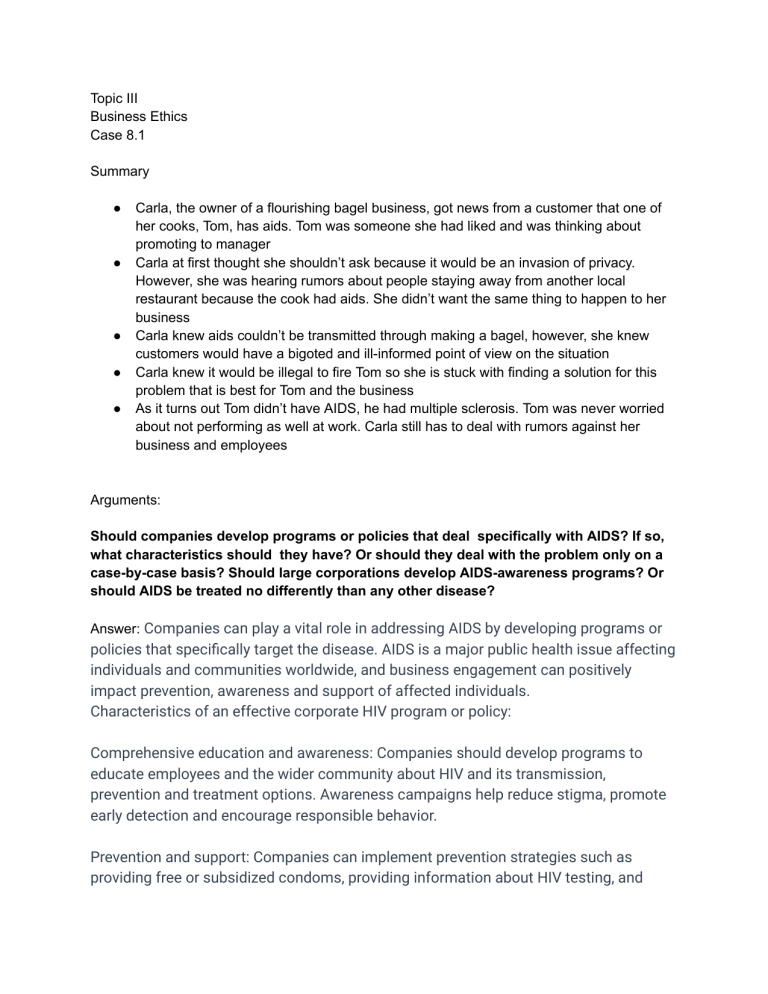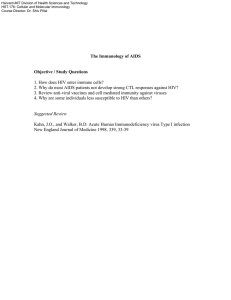
Topic III Business Ethics Case 8.1 Summary ● ● ● ● ● Carla, the owner of a flourishing bagel business, got news from a customer that one of her cooks, Tom, has aids. Tom was someone she had liked and was thinking about promoting to manager Carla at first thought she shouldn’t ask because it would be an invasion of privacy. However, she was hearing rumors about people staying away from another local restaurant because the cook had aids. She didn’t want the same thing to happen to her business Carla knew aids couldn’t be transmitted through making a bagel, however, she knew customers would have a bigoted and ill-informed point of view on the situation Carla knew it would be illegal to fire Tom so she is stuck with finding a solution for this problem that is best for Tom and the business As it turns out Tom didn’t have AIDS, he had multiple sclerosis. Tom was never worried about not performing as well at work. Carla still has to deal with rumors against her business and employees Arguments: Should companies develop programs or policies that deal specifically with AIDS? If so, what characteristics should they have? Or should they deal with the problem only on a case-by-case basis? Should large corporations develop AIDS-awareness programs? Or should AIDS be treated no differently than any other disease? Answer: Companies can play a vital role in addressing AIDS by developing programs or policies that specifically target the disease. AIDS is a major public health issue affecting individuals and communities worldwide, and business engagement can positively impact prevention, awareness and support of affected individuals. Characteristics of an effective corporate HIV program or policy: Comprehensive education and awareness: Companies should develop programs to educate employees and the wider community about HIV and its transmission, prevention and treatment options. Awareness campaigns help reduce stigma, promote early detection and encourage responsible behavior. Prevention and support: Companies can implement prevention strategies such as providing free or subsidized condoms, providing information about HIV testing, and promoting safe practices. In addition, they can provide support services to employees living with or affected by HIV/AIDS. Non-Discrimination Policy: Companies should adopt a non-discrimination policy that protects employees living with HIV/AIDS from discrimination and ensures equal opportunity in the workplace. Collaboration and partnerships: Companies can partner with healthcare organizations, NGOs, and government agencies to have broader impact and reach larger audiences. Access to treatment: Companies may consider offering health insurance, including HIV/AIDS treatment and medications, to support the health and well-being of employees. Community Engagement: Companies can engage in community activities and support local organizations working on HIV prevention, education and support. In terms of approach, companies must develop aggressive and sustainable programs to tackle AIDS, not on a case-by-case basis. By developing well-designed programs, companies can have a more significant and lasting impact on HIV awareness and prevention. For large businesses, they can play a key role in raising awareness due to their wider reach and influence. Developing an HIV awareness program contributes to a wider understanding of the disease and reduces the stigma surrounding it. However, this does not mean that AIDS should be treated differently from any other disease. All diseases, including AIDS, should be approached with compassion, support and understanding, and companies can make a positive contribution to public health through well-designed programs and policies to address them. Suppose a job applicant has a chronic, potentially debilitating medical condition. Should he or she reveal that fact before being hired? Would it be wrong not to mention tile disease if the interviewer inquires about tile applicant's health? The decision of whether to disclose a chronic medical condition during the job application process is a personal and complex one. There are both advantages and potential risks to consider. Here are some points to think about: Advantages of Disclosing: Accommodations: By disclosing the medical condition, the applicant may be eligible for reasonable accommodations under disability laws, which can help ensure they can perform their job effectively. Trust and Openness: Disclosing the condition can build trust and openness with the employer, potentially leading to a supportive and understanding work environment. Preparedness: Disclosing the condition can allow the applicant and employer to plan and make necessary arrangements, which may lead to a smoother transition into the job. Potential Risks of Disclosing: Discrimination: Unfortunately, some employers may have biases or misconceptions about certain medical conditions, leading to discrimination in the hiring process. Privacy: Disclosing a medical condition can potentially infringe on an individual's privacy, as some conditions may be sensitive or stigmatized. Impact on Hiring Decision: While it is illegal for employers to discriminate based on a medical condition, some employers may still unconsciously let it influence their hiring decision. Ultimately, it is the applicant's choice whether to disclose the medical condition. If the interviewer directly inquires about the applicant's health, it is generally recommended to respond honestly. However, the applicant is not obligated to share specific medical details and can simply state that they are able to perform the job with reasonable accommodations if needed.


